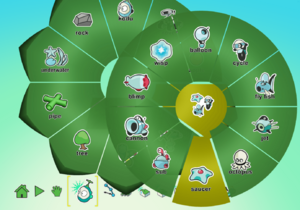Kodu Game Lab facts for kids
| Initial release | June 30, 2009 |
|---|---|
| Stable release |
1.6.18.0 / April 9, 2023
|
| Written in | C# |
| Operating system | Windows |
| Type | Visual programming |
Kodu Game Lab, first called Boku, is a special computer program from Microsoft. It helps you learn about coding and create your own video games! You can use Kodu on an Xbox 360 or a computer with Microsoft Windows. It first came out on June 30, 2009. Even now, in 2025, it still gets updates sometimes.
Contents
What is Kodu Game Lab?
Kodu is a fun tool that teaches you how to code using pictures and blocks instead of lots of words. It's made so that anyone can use it, even if you've never coded before. You build your games in a 3D world, and you program special characters called "bots."
Kodu is different from other game-making apps in a few cool ways:
- You don't have to type any code. You just pick blocks that show what you want to happen.
- Your games play out in a 3D world, not just a flat 2D screen.
- You use the visual tools and settings that Kodu gives you to make your game.
Many schools and learning centers use Kodu Game Lab to teach coding. When you finish a game, you can give it a name and description. You can also share your games online with other Kodu users!
How Kodu Helps You Learn Coding
Kodu makes learning to code easy and fun. It uses a simple system based on "when" something happens, "do" something else. This is called a logic-based system. It's like telling your character: "WHEN I see an apple, DO move towards it."
This simple way of coding helps beginners understand how programs work. You don't need to learn complicated things like variables or loops right away. Kodu lets you focus on making your characters do cool things in the game world.
Kodu's Simple Code Rules
The basic idea in Kodu is always: <condition> <action>
A <condition> is what needs to happen, like: <sensor> [<filter(s)> ...] This means "WHEN my character sees something" or "WHEN I press a button." You can add "filters" to make it more specific, like "WHEN I see a blue apple."
An <action> is what your character does, like: <verb> [<modifier(s)> ...] This means "DO move" or "DO jump." You can add "modifiers" to change how it happens, like "DO move quickly."
For example, a Kodu code line could be: WHEN see apple blue close-by DO move toward quickly This means your character will quickly move towards a blue apple that is nearby. You can even make code blocks indented to have more than one condition for an action.
Controlling Your Game
Kodu lets you control your game characters using different inputs. You can use your keyboard, mouse, or even an Xbox controller. This is how you make characters that players can move around.
When you program for a controller, you can even choose which player slot controls which character. This is great for making multiplayer games on the Xbox version of Kodu!
Meet the Kodu Characters
Kodu has many different characters, called "bots," that you can put into your 3D world. Each bot usually has its own special features and how it moves. For example, "object" bots like rocks or apples can't be programmed to move on their own.
Some characters have unique abilities. For instance, only the "Rover" bot can do certain science-themed actions. It also can't jump or shoot like other bots.
You can change the color of your bots (there are 11 colors!) and adjust their size. You can also change some of their other properties. Bots are the main way you create games in Kodu because they are the only things you can program using the tile system.
Since you don't have to add player input, you can even make games where the bots just interact with each other and the world. These are called zero-player games.
See also
- Educational programming language
- Visual programming language


